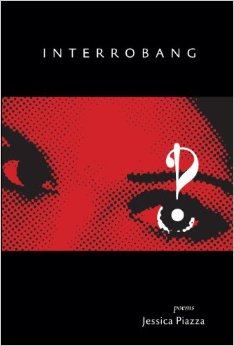|

Interrobang
Jessica Piazza
Red Hen Press
69 pages
2013
I don’t often spend as much time studying a Table of Contents as I did before beginning to read Jessica Piazza’s Interrobang. While I always appreciate a Table of Contents that reads like its own poem, this one instead had me learning the extreme fears (like asthenophobia, fear of weakness) and affections (like apodysophilia, love of undressing) that fill this collection. I also spent a lot of time thinking about one of the epigraphs from Merriam-Webster: “Interrobang: a punctuation mark designed for use especially at the end of an exclamatory rhetorical question.” Before reading this book, I imagined these poems would explore the speaker’s fears and affections in a way that would make me respond emotionally, that the purpose of reading wouldn’t be to receive answers about abnormal psychology but to see how Piazza’s speaker’s mental responses to living would affect my own. The speaker interacts with herself in such a way that I couldn’t help but feel moved to the deeper level of thinking implied by the title.
There are only three poems in this book that are not named for either a –phobia or –philia, and each of them spans several pages. The first of them, “People Like Us,” is also the second poem in the book, and it pulls the reader not only into the speaker’s fascinations, but innermost confessions. This poem first displays a violent playfulness as the speaker’s coping mechanism for allowing the reader so close: “Drawn curtain: faded, black. We fucked. We hollered. Back- / tracked and let sunlight in. Repeated. Weekended / in secret. Got outed. Paused. Rebounded. Tended / belabored hearts, but badly.” Later, the speaker’s relationship becomes universal, and this is where Piazza and the reader are the same: “And every winsome man’s like him—an eyelash shy / of possible. And every frantic woman wants / to get to the heart of a fleeing, wing-beating heart. / People like us: we’re dust, we’re everywhere.” The placement of this poem is critical, and it keeps the reader close to Piazza emotionally as this book becomes more personal.
I am delighted by the way these poems progress despite the diversity of subject matter. “Atephilia” (love of ruin) and “Basiphilia” (love of falling), for example, are placed on facing pages where the speaker first likens her and her lover’s bodies to rubble and second takes her lover to examine a fallen oak, which is particularly sad in the context of personal ruin: “Without / the noise, without the cavalcade that trunk / and branches make collapsing, what is left / for us is only aftermath.” This communication is especially apparent in “Eisoptrophilia” and “Eisoptrophibia,” love and fear of mirrors, when first “Impression pressed upon the glass perfects / even the grossest forgeries” and later the speaker reveals, “Reflected, I am never at my best.” These poems specifically highlight the darkness and light reflected by the close, personal study of one’s –phobias and –philias.
This theme of self-discovery develops in the book’s final piece, “What I Hold,” which begins with “A glint—an intimation of what gleams,” as if the speaker is searching for one final bit of truth, and looking inward continues to provide answers, but not all of them:
I need to get
perspective now, and so, unusual
as it may seem, I’ll stop to look outside
these lines; to ask if it is sin to pull
myself away from this, or prayer to ride
the story out. But who will answer me?
I’m not a girl who has epiphanies.
On the next page, the speaker has an epiphany, one that could have only come from the truth we find in other human beings, what Piazza calls in the final line of the book “a minute’s inkling of what gleams.” The journey of introspection in this book is fascinating, but not conclusive, and this feels both right and joyful. Piazza’s speaker knows that still more searching is needed, and the reader responds with an enthusiastic interrobang.
--Sarah Dravec
Sarah Dravec is a graduate student in the NEOMFA in Akron, Ohio, where she studies poetry. She is a poetry editor for Barn Owl Review. Her work has appeared or is forthcoming in And/Or, Blast Furnace, Bone Bouquet, Dressing Room Poetry Journal, *82 Review, and others.
Also by Sarah Dravec:
Review of The Bottom by Betsy Andrews
Review of Any Anxious Body by Chrissy Kolaya
Review of My Funeral Gondola by Fiona Sze-Lorrain
Review of The Forever Notes by Ethel Rackin
Review of Glass Armonica by Rebecca Dunham
Review of Vivarium by
Natasha Sajé
Review of Phrasebook for the Pleiades by Lorraine Doran
|
|

